Like many families, I hated being using the disposable nappy, the non-recyclable Ella’s Kitchen pouch, the plastic nappy bags and worst of all; the non biodegradable wet wipes. Every day I felt that we were hurting the planet and the guilt was building with every poop! Why were there no easily available and affordable alternatives to these items? When alternatives existed, WHY weren’t we happy to pay the extra margin and buy these products?
It wasn’t just the disposable baby care, the ‘disposable’ lifestyle had crept into most parts of our everyday life. Some-where along the line we stopped using our local green grocers and were buying fruit and veg wrapped in plastic from the supermarket. I rarely entered a charity shop anymore and was wasteful with food rather than re-purposing left overs as I used to do. Amazon was my ‘go to’ to buy anything and having voiced my disgust about the amount of packaging that was used to deliver the tiny item purchased, I’d do it all over again. It certainly wasn’t because we didn’t care about the environment, so why couldn’t we take those steps to shift our environmental impact? We were busy, yes, but everyone is. We were in denial. It took until our second child turned three years old to take stock, dig deep and make concentrated efforts greater than using a re-usable coffee cup and recycling our food waste to change the way we lived. And it all started with a soda stream…
I had picked up a spare soda stream from work that was otherwise going into the skip, reminiscing about using one as a child. Within two weeks we realised how many plastic bottles of sparking water we had been getting through. The penny dropped and we were encouraged, inspired, and on our way to make several small lifestyle changes that have had a significant impact on our lives. The key message here is that our changes were tiny, they didn’t take huge efforts and they didn’t cost us a lot of money. We shifted our mindsets and changed how we used every day household items. We educated ourselves, we ate less meat and we talked about all of this with our children along the way. For the busy everyday family, it’s hard to find the time and energy to shift towards a new daily routine, but this is exactly what needs to be done and this is how we did it.
Once we were committed, we set ourselves a monthly challenge (and budget) to make some changes. £20 less would be spent on take outs and otherwise invested on an eco-alternative each month. Here’s some of our successfully adopted changes.
- Optimise your recycling
Obvious right? We invested in an improved recycling station and set this up in our kitchen, religiously removing bottle lids and plastic wrap to ensure the items placed in were not rejected by the bin men. Our recycling output increased considerably, and the general (landfill) waste that we were generating halved! This took minimal effort and gave us great satisfaction! We hadn’t quite realised how sloppy we had got with our recycling. It’s an obvious starting point but I urge you all to try and find some small ways to increase your recycling output.
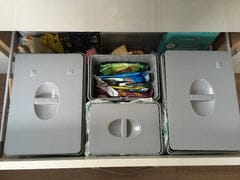
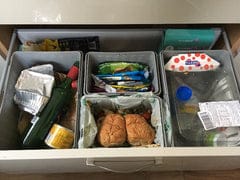
We also discovered local and national recycling initiatives such as making our own Eco Bricks www.ecobricks.org (more on that in a future blog) and Terracycle www.terracycle.com/en-CA which we use to recycle our crisp packets.
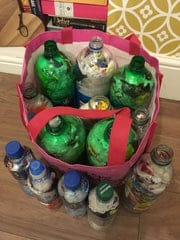
- Buy soaps
We said goodbye to shower gels and shampoos in plastic bottles and bought soap bars as alternatives. Its odd, I grew up using bars of soap and yet when I bought our first one, it felt like a novelty! I felt a lovely sense of nostalgia using soaps again, the smells are so much better than anything from a bottle!
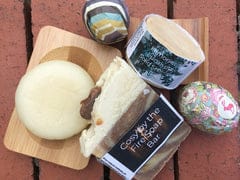
The leap to using shampoo and conditioner bars is an interesting one. 3 words: STICK WITH IT! My next blog will be specifically about this journey so watch out for it. The rewards far out way the transition stages even for the most hair concerned people (like me) TIP: Don’t forget to buy a wooden soap dish as an alternative to a hard plastic one!
- Soda stream
More than the £20 monthly budget to buy new (circa £100 depending on where you buy) but there’s no reason why this can’t be a few ‘months’ worth of eco-budget. Each reusable SodaStream bottle is tested to replace over 50,000 conventional bottles and cans. By promoting the use of tap water to create sparkling water, using a SodaStream reduces the need for traditional shop-bought beverages sold in single-use bottles. This results in less plastic manufactured, less plastic waste, and less transport of bottled beverages. In addition, SodaStream helps reduce the carbon footprint of sparkling water consumption by 80 percent!*
The gas refills cost around £15-£20 and last 2 months on average (based on 60L). To keep costs down, Soda Stream offer a wonderful gas cannister refill exchange where you only pay for the gas - https://sodastream.co.uk/products/60l-exchange-cylinder-single to find out more. We have two bottles on the go in the fridge at all times and I’m actually drinking loads more water as it is cold and feels fresh. Win Win!
- Feminine care
OK ladies, the biggie. Let’s just stop and think about the amount of un-recyclable sanitary waste that is being produced every day. It’s estimated that in the UK about 700,000 panty liners, 2.5 million tampons and 1.4 million sanitary towels are flushed down the toilet every day.** The average woman will use over 11,000 disposable sanitary goods in her reproductive lifetime. I know its not pretty to think about menstrual cups and tampon alternatives, but periods are not pretty however you look it and better to choose sustainable options than consider the far less pretty landfill affects of disposables.
So where to start? I made the leap and bought a menstrual cup. It cost me £18 from Sainsburys and aside from fully replacing the need for tampons/pads, this action has already saved me over £50 in pads and tampons since I bought it 😊. For many though, I totally appreciate that a menstrual cup is a step too far and that’s fine. Life is about balance. Happily, more and more eco-products are being developed in this sector. At Green Alternatives Ltd, we’ve chosen to stock FLO. A bold fully bio-degradable brand that is committed to giving back to women across the world through projects such as Orchid Project, Red Box Project & Bloody Good Period.
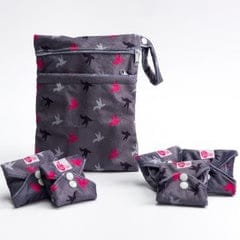
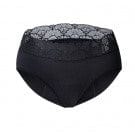
I also highly recommend investing in some Period Pants. I bought a pack of three period pants from www.cheekywipes.co.uk that are lined through the gusset and I haven’t bought a pack of panty liners since! I’ve also bought a selection of re-usable sanitary pads from this company who seem to be leading the UK market in this sector (hence Green Alternatives Ltd are happy to now be official affiliates of Cheeky Wipes).
- Educate yourself
Want to feed your brain with reasons why you are making these changes? We bought a few eco-living books, but by far the most thought provoking was Turning The Tide On Plastic by Lucy Siegle. If this book doesn’t convince you to make some small but significant changes in your life then nothing will!
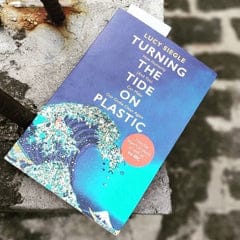
- Sandwich & snack wraps
We all know how devastating cling film is for the environment. In the UK, we get through 1.2 billion metres of cling film every year.*** The stuff simply won’t be recycled on any level! Happily, there are plenty of clingfilm and foil wrap alternatives on the market. Not so happily, they are often expensive.
Wax wraps are worth investing in. There, I’ve said it! Yes, it’s going to cost you over £10 for pack of 3 beeswax wraps, more if you choose a vegan option. But honestly, they are delightfully efficient and actually very pleasing to use😊. I can’t remember the last time we used cling film – I still have a half-used roll in my kitchen drawer that I’m trying to figure out what to do with!
On a budget? Make some wax wraps yourself. Moral Fibres have a great blog showing you how to do this 😊. We are yet to make any DIY wraps although at Green Alternatives Ltd, I’m looking to develop a cheeky easy to use kit that we can offer – watch this space for this one.
We are constantly learning and making new changes. If you manage to have a go at even one of the ideas above then that’s bloomin amazing! Do it at your pace, don’t feel pressured by anyone and know that your individual actions, however small, may just inspire one other person to make a change. We have so much more to learn and our £20 monthly eco-budget is still a ‘thing’. We are currently experimenting with toothpaste and mouthwash alternatives, trying to source that perfect washing up eco-scrubbing brush alternative and have signed up to a number of local litter picking events. Setting up Green Alternatives Ltd over the past few months with my husband has truly inspired me further and I’m looking forward to blogging away the rest of the year with eco-advice and thoughts as they pop into my mind.
If you enjoyed this blog then please let me know! You can comment here and if you would like to take a look at the Green Alternatives website to see many other eco-alternatives to every day items then you are very welcome!
*https://www.plasticpollutioncoalition.org/pft/2017/1/6/the-inside-story-sodastream-vs-the-international-bottled-water-association
**https://www.citytosea.org.uk/unflushables/
*** Siegle.L: ‘Turning The Tide on Plastic’
